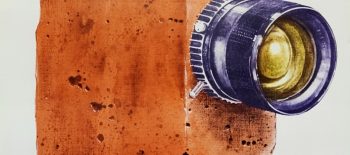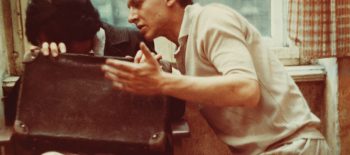Announcing a Virtual Retrospective of Renowned Polish Filmmaker Andrzej Munk
August 20–September 10
Film at Lincoln Center
Tickets are now available here.
Tickets are $5. A discounted All-Access Pass will also be available for $20. FLC members receive an additional 20% discount on all film rentals and pass purchases.
Presented by Film at Lincoln Center in partnership with the Polish Cultural Institute. Organized by Tyler Wilson and Tomek Smolarski (Polish Cultural Institute New York).
Film at Lincoln Center (FLC) announces a virtual retrospective of Polish filmmaker Andrzej Munk, showcasing seven pivotal films, all newly restored, that bring his cinematic contributions into sharper focus. The series kicks off August 20 in the FLC Virtual Cinema.
Considered one of the founders of the Polish Film School movement, along with Andrzej Wajda and Jerzy Kawalerowicz, Andrzej Munk began his career making agitprop documentaries in the era of Stalinized Poland, and, in the aftermath of the 1956 Polish thaw, came to artistic maturity with a suite of shrewdly incendiary features. Although his career was brief—he died in a car accident in 1961, during the making of his final feature, Passenger—the films made by Munk throughout the ’50s have come to encapsulate the spirit of rebellion in postwar Poland. These works bristled with cool skepticism, and indefatigable elements of satire and irony that evaded state censorship guidelines; many explored the perverse survival instincts and displacement arising from war, while others witnessed the hardship and beauty of everyday labor.
Munk received a posthumous award at the 1964 Cannes Film Festival recognizing his entire oeuvre, and his influence persists, visible in the work of renowned Polish filmmakers such as Krzysztof Zanussi, Krzysztof Kieślowski, and Jerzy Skolimowski, Munk’s former student.
FILMS & DESCRIPTIONS

Men of Blue Cross
The Men of the Blue Cross / Błękitny krzyż
Poland, 1955, 56m
Polish with English subtitles
By the mid-1950s, Munk began to make what he referred to as “dramatized documentaries,” in which he took greater liberties with staging and nonprofessional actors. In The Men of the Blue Cross, considered by some to be his first overtly fictionalized film, actual mountaineers reenact a rescue mission they had carried out in the Tatra Mountains during World War II. Roughly 10 years after the fact, Munk dabbled in the visual compositions of a genre film to recreate some of the rescuers’ most dramatic memories—including their escape from an avalanche and a shootout with German soldiers—using a combination of intricately lit spaces and verité, on-location cinematography. Restoration by Fixafilm.
Screening with:
Destination
Destination – Nowa Huta! / Kierunek – Nowa Huta!
Poland, 1951, 13m
Polish with English subtitles
In this deceptively chipper piece of agitprop, a narrator details the laborious construction of Nowa Huta, a utopian city built as one of the few monuments to Poland’s fellowship with the Soviet Union. Restoration by Warsaw Documentary Film Studio (WFDiF).

Man on the Tracks
Man on the Tracks / Człowiek na torze
Poland, 1957, 82m
Polish with English subtitles
A provocative examination of party-line deviation and coercion in Stalinized Poland, Man on the Tracks takes place in the aftermath of a locomotive driver’s ostensible suicide, and centers on an investigation of the deceased, Orzechowski, whose questionable political orientation makes him the prime suspect in a railway sabotage case. In the first of Munk’s many collaborations with the writer Jerzy Stefan Stawiński (who also penned Wajda’s Kanał), a mystery unfolds through a Rashomon-style structure, with Orzechowski’s bosses and assistants rendering their impressions of him and the events leading to his demise via extended flashbacks. Absent any music, the film sustains a grim, skittish atmosphere with the sounds of whistles, alarms, and pistons that punctuate its laconic dialogue and austere compositions. Restoration by The Chimney Pot and Soundplace.

Eroica
Eroica
Poland, 1957, 80m
Polish with English subtitles
Munk’s international breakthrough film represented a formative leap in the director’s style and tone. Based on two short stories by frequent collaborator Jerzy Stefan Stawiński, this diptych snaps from comedy to tragedy to deconstruct notions of Polish heroism in World War II. The first episode, a sharply pointed farce titled “Scherzo alla Polacca,” follows a quixotic bon vivant after he deserts Poland’s underground resistance to avoid the Warsaw Uprising. The far more despairing narrative “Ostinato Lugubre” involves a group of Polish POWs and one soldier’s hopeless attempt at escape. Munk’s wartime symphony is steeped in humor, yet fully aware of the dark visions of war and its horrors, particularly the nationalistic mores impressed on societies. Restoration by The Chimney Pot and Toya Studios.

Bad Luck
Bad Luck / Zezowate szczęście
Poland, 1960, 109m
Polish with English subtitles
A withering satire on the tactics of opportunism in early-20th-century Poland, Munk’s penultimate film shows the director at his most simultaneously acerbic and controlled. Bugumił Kobiela (Ashes and Diamonds) stars as Piszczyk, an “unlucky” Pole who looks back on the various crises of his life to protest his release from a communist prison. Munk once again turns to the flashback strategy to unveil his protagonist’s unscrupulous survival instincts that perpetually, and hilariously, backfire. Blisteringly subversive and wonderfully idiosyncratic, Bad Luckis something like a Witold Gombrowicz novel translated by Charlie Chaplin. Restoration by Fixafilm.

Passenger
Passenger / Pasażerka
Poland, 1961-63, 59m
Polish with English subtitles
Incomplete at the time of Munk’s death in 1961, Passenger takes as its focus the harrowing relationship between two women in a German concentration camp, as recalled by a former guard after she encounters, years later aboard a luxury cruise ship, one of her Polish ex-prisoners. Working from footage shot just before his fatal accident, Munk’s collaborators (notably director Witold Lesiewicz and writer Wiktor Woroszylski) constructed a speculative version of the film, partially made up of still shots. The film is as much a profoundly disturbing comment on trauma, memory, and freedom as it is an intriguing experiment, permeated by an unmistakable sense of admiration from the late filmmaker’s contemporaries. A NYFF2 selection. Restoration by DI Factory.
Screening with:
A Walk in the Old City of Warsaw
A Walk in the Old City of Warsaw / Spacerek staromiejski
Poland, 1958, 18m
In this vibrant collaboration with the composer Andrzej Markowski, a young music student wanders around the alleys and buildings of Warsaw’s Old Town. Without any dialogue, Munk creates an eccentric atmosphere by fusing Markowski’s instrumentation with the ordinary sounds of the city. Restoration by Warsaw Documentary Film Studio (WFDiF).
Acknowledgements:
Ewa Mulić and Marika Cieślik, Warsaw Documentary Film Studio (WFDiF); The Chimney Pot; DI Factory; Fixafilm; Soundplace; Toya Studios.



